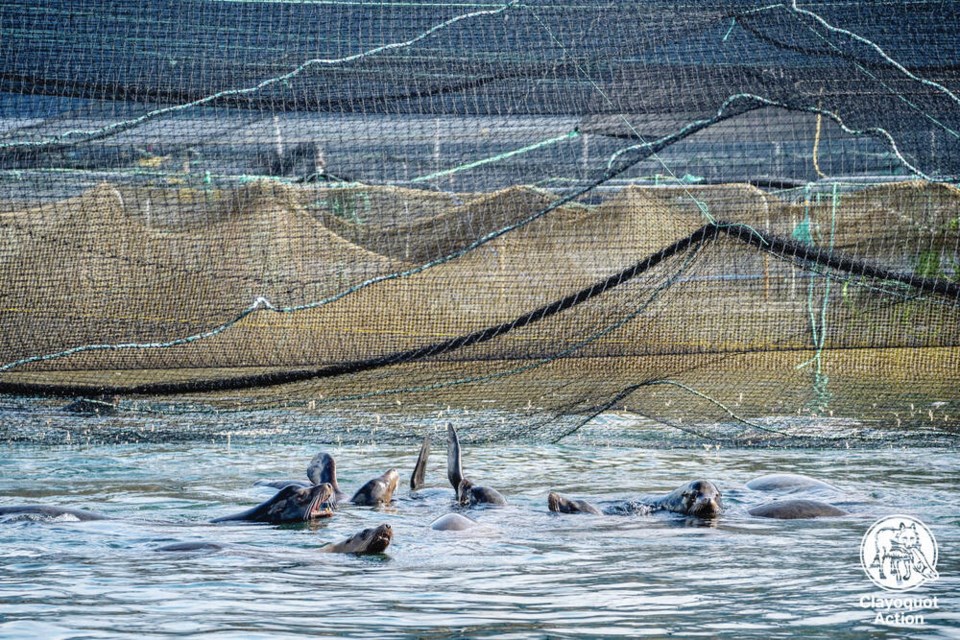A number of B.C. fish farms have seen a spike in attacks from sea lions, prompting multiple companies to request the use of rubber bullets as a deterrent, internal government communications reveal.
Sea lions “have breached the system and are being aggressive to staff,” wrote Krista Sandberg, regional manager of aquaculture environmental operations at Fisheries and Oceans Canada, describing the situation at a fish farm run by the aquaculture company Mowi near Port Hardy.
“[They] have requested to [use] rubber bullets to gain control of the situation.”
It was the second use of aggressive sea lion deterrents at the facility this season, said Sandberg, whose emails — including the one dated Feb. 5 — were released under federal Access to Information and Privacy Laws.
Elsewhere off B.C.’s coast, Sandberg told colleagues this has been the “worst sea lion season to date” at a fish farm in Clayoquot Sound’s Fortune Channel. Staff have spent much of their time releasing the trapped animals in the face of “multiple breaches,” she said.
And at multiple salmon farms off southwest Vancouver Island, operators told DFO that up to 15 sea lions are hanging around their open-net pens.
DFO hands out five approvals to use rubber bullets against sea lions
B.C.’s coastal fish farms have attracted large marine predators for more than 30 years.
In the past, licence holders could shoot problem animals dead. In 1999, 733 seals and sea lions died in connection with B.C.’s aquaculture industry.
DFO ended permissions for lethal removal in 2000. Over the next decade, the number of never climbed above 300 a year before falling even further.
Deadly encounters for both farmed fish and marine mammals still occurred. At least three humpback whales have been killed in connection with fish farms, including one that was found dead after it got in an aquaculture anchor near Bella Bella in 2017.
Farmed fish have also seen significant casualties. In a high-profile incident in 2022, about two dozen Steller and California sea lions at a Cermaq Canada fish farm northeast of Tofino and feasted on the farmed Atlantic salmon.
Today, fish-farm operators have to apply for permission to use aggressive deterrents. Over the past year, the federal government has approved five requests to use rubber bullets against marine predators, a DFO spokesperson confirmed.
Stan Proboszcz, a biologist with Watershed Watch Salmon Society, said the internal DFO emails paint a vivid picture of how fish-farm operators continue to fend off wildlife.
“It’s a bit crazy,” he said. “It gives you this image of wars between marauding sea lions and workers with weapons.”
Rubber bullets useful as last line of defence, says DFO
Michelle Franze, a spokesperson for the B.C. Salmon Farmers Association, said salmon farmers are required to outline plans to prevent conflict before farming starts at each site. Once the fish farm is in operation, she said farmers are trained to respond with preventative measures, including non-lethal deterrents.
In the 12 months leading up to February 2025, the deaths of 10 seals and sea lions have been linked to fish farms. In two cases, a California Sea Lion and a killer whale were released after getting trapped, according to the most recent DFO .
“This trend reflects the success of the sector-wide ‘no-kill’ marine mammal management policy adopted in 2012, as well as significant investments in exclusion technology and staff training,” Franze said.
A DFO spokesperson said the most effective method of deterring sea lions is deploying things like external predator nets and fencing.
“However, there are occasions where this infrastructure may fail, allowing sea lions breached access to a farm,” said the spokesperson in an email. “While not consistently effective, rubber bullets and other more aggressive deterrents, can be useful in encouraging marine mammals to leave farm infrastructure when less aggressive methods prove unsuccessful.”
However, DFO’s own suggests “tactile harassment” — including blunt-tipped arrows and rubber bullets — have been shown to cause “no significant change in predation rates” or have had “limited success.”
The conclusions are based on field studies carried out in Oregon and Washington state.
Proboszcz says it’s no surprise pens full of fish are attracting predators like sea lions. He likened the situation to leaving out a pile of food for bears at a wilderness campsite.
“This is just a ton of food for a lot of species,” he said.



